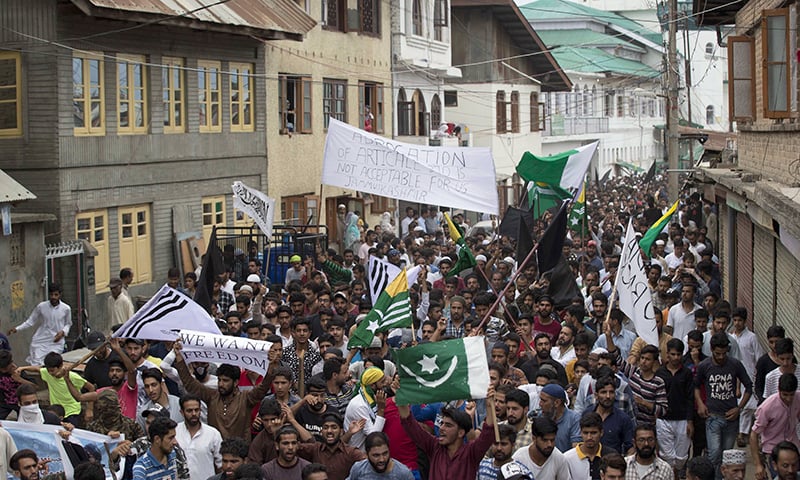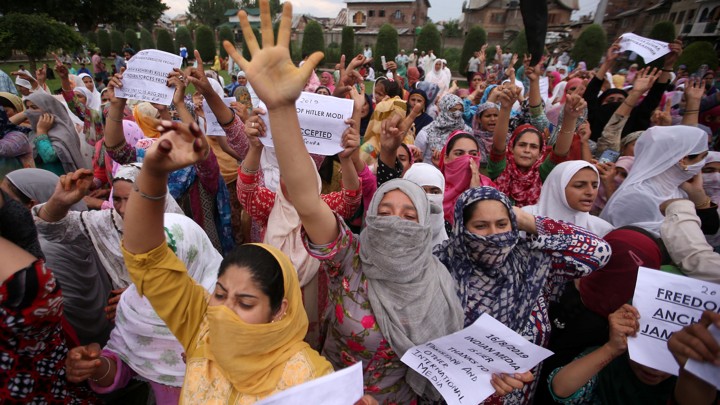www.aljazeerah.info
Opinion Editorials, August 2019
Archives
Mission & Name
Conflict Terminology
Editorials
Gaza Holocaust
Gulf War
Isdood
Islam
News
News Photos
Opinion Editorials
US Foreign Policy (Dr. El-Najjar's Articles)
www.aljazeerah.info
Abrogation of Article 370 of the Indian Constitution (About Kashmir) Maybe the Beginning of the Country Disintegration By Mihaj Qidwai Al-Jazeerah, CCUN, August 19, 2019 |
 |
 |
| Protesters shout slogans and march on a street after Friday prayers in Srinagar, August 9, 2019 | Kashmiri women protesters shout slogans and march on a street after Friday prayers in Srinagar, August 16, 2019 |
Modi-The Gorbachev of India
The dissolution of the Soviet
Union was the process of internal disintegration
within the Union
of Soviet Socialist Republics (USSR)
which began in second half of 1980s with a series of national unrests.
It was sped up when
after his inauguration in January 1989, President George H.W.
Bush ordered a strategic policy re-evaluation in order to establish his
own plan and methods for dealing with the Soviet Union and arms control.
With the policy review complete, and taking into account unfolding
events in Europe, Bush met with Gorbachev at Malta in early December
1989. They laid the groundwork for finalizing
Strategic Arms Reduction Treaty
(START)
negotiations, completing the Conventional Forces in Europe treaty, and
discussed the rapid changes in Eastern Europe. Following two years led
to the series of events culminating on
25th December 1991, when
Soviet President Mikhail
Gorbachev,
the eighth
and final leader of the USSR,
resigned, declared his office extinct and handed over its
powers—including control of the Soviet
nuclear missile launching codes—to Russian
President Boris
Yeltsin.
The
Soviet hammer and sickle flag lowered for the last time over the
Kremlin, thereafter replaced by the Russian tricolor. People all over
the world watched in amazement at this relatively peaceful transition
from former Communist monolith into multiple separate nations.
On 26th December 1991, the USSR itself was voted out of
existence by the Supreme
Soviet,
following the Belavezha
Accords. Declaration number 142-Н by the Supreme Soviet
resulted in self-governing independence to the Republics
of the USSR,
formally dissolving the USSR. The declaration acknowledged the
independence of the former Soviet republics and created the Commonwealth
of Independent States (CIS).
The above is a prelude to
what is offing for India. With the landslide victory allowed for Modi to
be in power and convert it into an extremist Hindu state the ball has
been set in rolling with the revocation of the special status of
Indian-administered Kashmir in its constitution. A presidential decree
issued on August 5 2019, revoked
Article 370 of India's constitution that
guaranteed special rights to the Muslim-majority state of Jammu and
Kashmir, including the right to its own constitution and
autonomy to make laws on all matters, except defence, communications and
foreign affairs.
At the time of division of
subcontinent, there were 565 princely states. The Muslim majority were
supposed to go to Pakistan and Hindu Majority to India. Regardless of
this understanding, Radcliffe Commission on 17th of August
1947 gave 13 to Pakistan and 552 to India. India signed Instrument of
Accession with all except
3 (Junagarh, Hyderabad and Kashmir). However, through so called
referendum Junagarh joined India, with Operation Polo Hyderabad was
annexed, while Jammu and Kashmir remained Independent.
Those falling in the territory
of India were invited
to send representatives to India's Constituent Assembly, which was
formulating a constitution for the whole of India. They were also
encouraged to set up constituent assemblies for their own states. Most
states were unable to set up assemblies in time, but a few states did,
in particular Saurashtra
Union, Travancore-Cochin and Mysore.
Even though a model constitution was developed for the states, in May
1949, the rulers and chief ministers of all the states met and agreed
that separate constitutions for the states were not necessary. They
accepted the Constitution of India as their own constitution. The
position of all the states (or unions of states) thus became equivalent
to that of regular Indian provinces. In the case of Jammu and Kashmir,
the representatives to the Constituent Assembly requested
that only those provisions of the Indian Constitution that corresponded
to the original Instrument of Accession should be applied to the State.
Accordingly, the Article 370 was incorporated into the Indian
Constitution, which stipulated that the other articles of the
Constitution that gave powers to the Central Government would be applied
to Jammu and Kashmir only with the concurrence of the State's
constituent assembly. This was a "temporary provision" in that its
applicability was intended to last till the formulation and adoption of
the State's constitution. However, the State's constituent
assembly dissolved itself on 25 January 1957. According to the Supreme
Court of India and the High
Court of Jammu and Kashmir,
the Article "acquired a
permanent status" in the Indian constitution. So, what was the need for
disturbing the status-quo?
The abrogation of permanent
status of Kashmir may have been planned due to:
-
It was the only state having its own Constitution and a separate flag.
This is not the case in other states which may have some special
provision in the Constitution.
-
It is a Muslim dominant state and will lead to the foundation of a real
Hindustan.
-
It will pave the way for inhabitation of Hindus in Kashmir; and
-
A reason to strike on Azad Kashmir under Pakistan.
However, this may also be a prelude to the disintegration of India. So,
what are the signs that Mr. Modi will be the Gorbachev of India?
1.
Modi winning second time with the promise to make India real Hindustan.
The events in Kashmir has given signal to other states for reconsidering
their position in India.
2.
With
the abolition of Article 370 of
the Constitution, the 10 states other than Jammu and Kashmir which
enjoyed special category status will also be effected. These are
Arunachal Pradesh, Assam, Himachal Pradesh, Manipur, Meghalaya, Mizoram,
Nagaland, Sikkim, Tripura and Uttarakhand. This (abrogation) might serve
as a template for these special category states to review their accord
status with India.
3.
An uprising in Kashmir will be supported by Sikhs in Khalistan and they
have been demanding their independent status since a long time.
Operation Blue Star only oppressed their struggle but not the desire.
4.
There is no opposition to Modi’s one party rule with an autocratic
approach. Fascist rulers and parties do not survive long.
5.
India has been made a country where “COW” has gained more importance
than human life. Lynching of Muslims and disrespect to women are on
rise.
6.
Geo political changing situation where India is towing on the lines of
Israel for turning Kashmir into Palestine.
7.
It will be difficult for India to sustain the pressure of the uprising
of Kashmiris. Palestinians
do not have much support except that of Hamas, but the Kashmiris will
have support from Sikhs, Pakistan and others.
8.
With Iran in opposition to Israel, time is not far away where it may
reconsider its relations with India and start supporting the struggle of
Kashmiris.
9.
The abrogation of article 370 must have been discussed with UK, USA,
Russians and others who have given a nod. However, China, will be ready
to seize the opportunity for the division of India.
Therefore, by abrogation of article 370, Mr. Modi has fathered the disintegration of India. The Caesarean Section probably will be performed by China and the labour will be assisted by Pakistan, Nepal, Bhutan, and Sri Lanka along with the Indian states aspiring for independence.
***
Share the link of this article with your facebook friends
|
|
|
|
||
|
||||||


